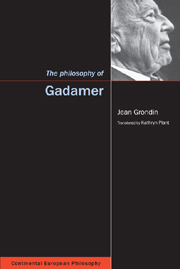Book contents
- Frontmatter
- Contents
- Abbreviations
- Translator's Note
- Introduction
- 1 The Problem of Method and the Project of a Hermeneutics of the Human Sciences
- 2 Truth after Art
- 3 The Destruction of Prejudices in Nineteenth-Century Aesthetics and Epistemology
- 4 Vigilance and Horizon in Hermeneutics
- 5 The Dialogue that We Are
- Conclusion
- Notes
- Bibliography
- Index
5 - The Dialogue that We Are
- Frontmatter
- Contents
- Abbreviations
- Translator's Note
- Introduction
- 1 The Problem of Method and the Project of a Hermeneutics of the Human Sciences
- 2 Truth after Art
- 3 The Destruction of Prejudices in Nineteenth-Century Aesthetics and Epistemology
- 4 Vigilance and Horizon in Hermeneutics
- 5 The Dialogue that We Are
- Conclusion
- Notes
- Bibliography
- Index
Summary
Towards the uncanny nearness of language
“To understand what takes us”, to seize what has forever seized us, is how we can resume the paradoxical wager of hermeneutics. The hermeneutics that we have dared to call “projection” focuses on the addition of understanding to a dimension which avoids instrumentalism in that it takes note of our projected being more than it does of our projects. It is so in history, to which we belong much more than it belongs to us. In 1960, Gadamer saw that the most satisfactory way in which a being worked by history could add to its knowledge was through language. This effectiveness of language contributes to “what is the most obscure” (gehört zum Allerdunkelsten), because the linguistic element remains “uncannily near” (so unheimlich nahe) for thought. The unheimlich is, in the literal sense, what is foreign to us, and what, accordingly, gives us the shivers. But Gadamer's thought is precisely that this unheimlich element of language represents our “home”. It is in fact in the uncanny nearness, or according to Fruchon's translation, just right, in the “disturbing proximity” of language that we live. Gadamer's hermeneutics, which remains one of “projection”, cannot ignore this Unheimlichkeit, this disconcerting and immemorial nature of language, but it will never acquire a static mastery of it. How do we master what forever seizes us? In beginning a thought, which can remind us of Heidegger's words, we can at the very most hope “to approach the obscurity of language”.
- Type
- Chapter
- Information
- The Philosophy of Gadamer , pp. 123 - 142Publisher: Acumen PublishingPrint publication year: 2002

